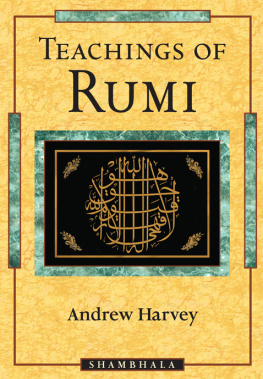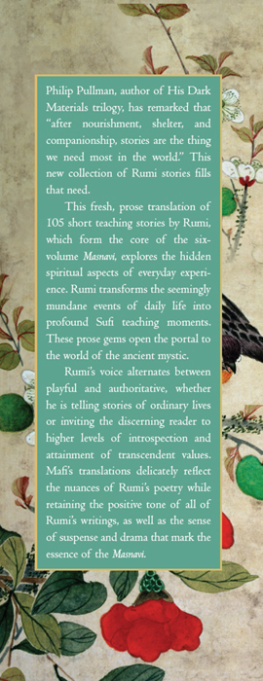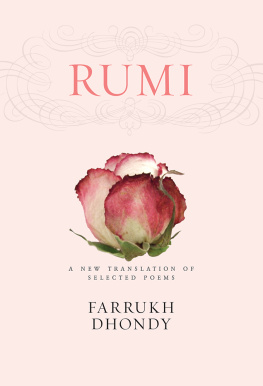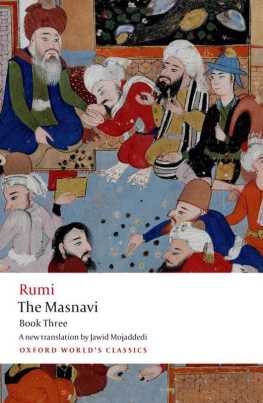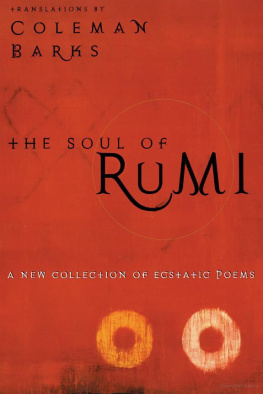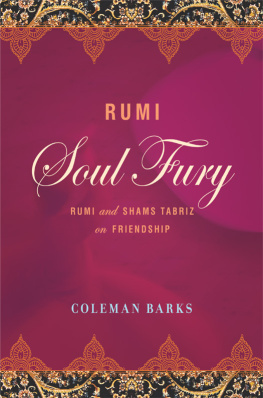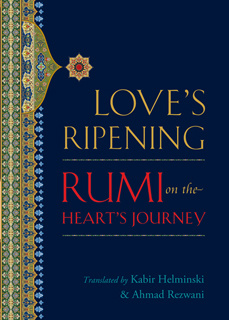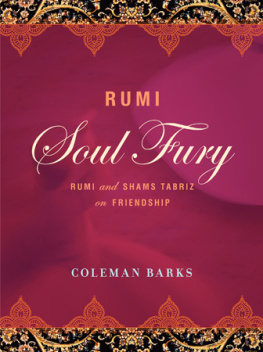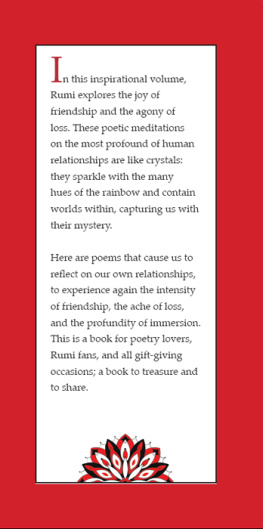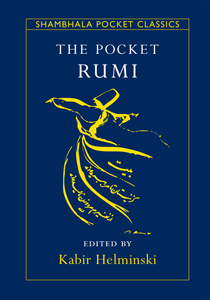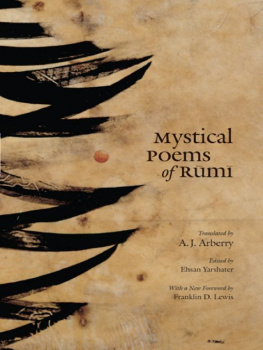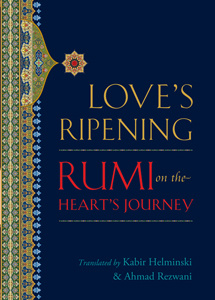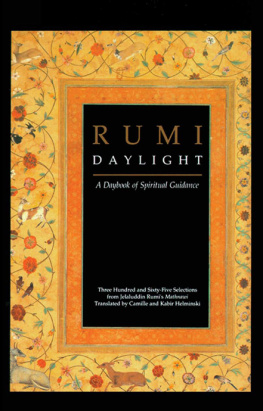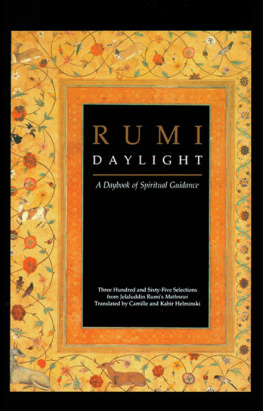Rumi - Teachings of Rumi
Here you can read online Rumi - Teachings of Rumi full text of the book (entire story) in english for free. Download pdf and epub, get meaning, cover and reviews about this ebook. publisher: Shambhala, genre: Art. Description of the work, (preface) as well as reviews are available. Best literature library LitArk.com created for fans of good reading and offers a wide selection of genres:
Romance novel
Science fiction
Adventure
Detective
Science
History
Home and family
Prose
Art
Politics
Computer
Non-fiction
Religion
Business
Children
Humor
Choose a favorite category and find really read worthwhile books. Enjoy immersion in the world of imagination, feel the emotions of the characters or learn something new for yourself, make an fascinating discovery.
- Book:Teachings of Rumi
- Author:
- Publisher:Shambhala
- Genre:
- Rating:3 / 5
- Favourites:Add to favourites
- Your mark:
- 60
- 1
- 2
- 3
- 4
- 5
Teachings of Rumi: summary, description and annotation
We offer to read an annotation, description, summary or preface (depends on what the author of the book "Teachings of Rumi" wrote himself). If you haven't found the necessary information about the book — write in the comments, we will try to find it.
Rumi: author's other books
Who wrote Teachings of Rumi? Find out the surname, the name of the author of the book and a list of all author's works by series.
Teachings of Rumi — read online for free the complete book (whole text) full work
Below is the text of the book, divided by pages. System saving the place of the last page read, allows you to conveniently read the book "Teachings of Rumi" online for free, without having to search again every time where you left off. Put a bookmark, and you can go to the page where you finished reading at any time.
Font size:
Interval:
Bookmark:
ABOUT THE BOOK Jelalludin Rumi (12071273) led the quiet life of an Islamic teacher in the central Anatolia (modern Turkey) until the age of thirtyseven, when he met a wandering dervish named Shams Tabrizthrough whom he encountered the Divine Presence in a way that utterly transformed him. The result of this epiphany was the greatest body of mystical poetry the world has ever seen, and the establishment of a spiritual movement that would eventually stretch from Africa to China, enduring to our own day. This collection of versions of Rumi by Andrew Harvey contains some of the masters most luminous verse, along with selections from his lesserread prose works, with the aim of presenting a balanced view of his teaching that includes both the highflying love of God and the rigorous path of discipline essential for those who seek it. ANDREW HARVEY is the author of Son of Man: The Mystical Path to Christ and more than thirty other books. He has also published several other collections of Rumi, including The Way of Passion. Sign up to learn more about our books and receive special offers from Shambhala Publications. Teachings of RUMI Re-created and edited by ANDREW HARVEY  SHAMBHALA Boston & London 2012 SHAMBHALA PUBLICATIONS, INC. Teachings of RUMI Re-created and edited by ANDREW HARVEY
SHAMBHALA Boston & London 2012 SHAMBHALA PUBLICATIONS, INC. Teachings of RUMI Re-created and edited by ANDREW HARVEY  SHAMBHALA Boston & London 2012 SHAMBHALA PUBLICATIONS, INC.
SHAMBHALA Boston & London 2012 SHAMBHALA PUBLICATIONS, INC.
Horticultural Hall 300 Massachusetts Avenue Boston, Massachusetts 02115 www.shambhala.com 1999 by Andrew Harvey Cover art: Page of manuscript of Quran. Iran, sixteenth century. Reproduced by kind permission of the Trustees of the Chester Beatty Library, Dublin. All rights reserved. No part of this book may be reproduced in any form or by any means, electronic or mechanical, including photocopying, recording, or by any information storage and retrieval system, without permission in writing from the publisher. p. cm. eISBN 978-0-8348-2680-9 ISBN 978-1-57062-346-2 1. eISBN 978-0-8348-2680-9 ISBN 978-1-57062-346-2 1.
Jall al-Dn Rm, Maulana, 12071273. 2. Mevleviyeh. I. Harvey, Andrew, 1952 BP189.7.M42T43 1999 98-54866 297.4092dc21 CIP For GLORIA VANDERBILT COOPER Real Lovers serve ardently, hopefully, in an ecstasy of awe. RUMI CONTENTS To my Mother, for the inspiration of her love of truth. To Eryk, my husband, bringer of fire and tender heart-companion.
To Leila and Henry Luce, for their constantly encouraging kindness. To Mara and Joey Singer, for the truth of their friendship. To Tracy Cochran, for her kind and generous help and witness. To Tami Simon, for her clarity and integrity. To Eva de Vitray Meyerovitch, for her pioneering work and for many hours of communion in the presence of Our Beloved. To my editor, Dave ONeal, for his support and vision.
To the blessed memory of Bella von Heinz, who first awoke me to the wonder of Islam. J ALAL-UD-DIN RUMI, the greatest mystic of Islam, and, many people believe, of the world, was born in Balkh, Afghanistan on September 30, 1207, and died in Konya, Southern Turkey, on December 17, 1273. He left behind as the record of his extraordinarily intense life, lived on the wildest and grandest heights of the spirit, the Mathnawi, a mystical epic; 3,500 odes; 2,000 quatrains; a book of table talk; and a large volume of letters. The Mevlevi order that he founded and that was continued by his son, Sultan Valad, spread his vision all over Asia and Africa and now has centers all over the world. In the last twenty years, through the pioneering translations of Coleman Barks, Robert Bly, Kabir Helminski, and Jonathan Star, among others, Rumi has become, as Bill Moyers pointed out in his recent television special on him, the most popular poet in America, read and loved by seekers of all persuasions and creeds. For hundreds of thousands of people, Rumis work in its passion, honesty, and gorgeous imagery has become a way of connecting directly with the Divine beyond the constrictions of religion or dogma.
Rumi now commands in the West what he has long commanded in the Eastan unassailable position as the most poignant and vibrant of all celebrators of the Path of Love and as a supreme witness, in a way that transcends all national, cultural, and religious boundaries, to the mysteries of Divine Identity and Presence. Rumi combined the intellect of a Plato, the vision and enlightened soul-force of a Buddha or a Christ, and the extravagant literary gifts of a Shakespeare. This unique fusion of the highest philosophical lucidity with the greatest possible spiritual awareness and the most complete artistic gifts give Rumi unique power as what might be called a Sacred Initiator or Initiator into the Sacred. Born out of the fire of a vast Awakening, Rumis work has an uncanny direct force of illumination; anyone approaching it with an open heart and mind, at whatever stage of his or her evolution, will derive from it inspiration, excitement, and help of the highest kind. Everything Rumi wrote or transmitted has the unmistakable authority of total inner experience, the authority of a human being who has risked and given everything to the search for divine truth. As fears of an environmental apocalypse grow, and the terrible dangers that afflict humanity on every level become more and more inescapably clear, Rumis work will become increasingly important for its testimony to the divine origin and purpose of human life, its overwhelmingly beautiful celebration of the truths and mysteries of Divine Glory, and its wise embrace of all paths and approaches to the experience of God.
Increasingly, it will become clear that Rumi is not only humanitys supreme mystical poet but also one of its clearest guides to the mystical renaissance that is trying to be born in the rubble of our suicidal civilization. What might be called the Return of Rumi to the consciousness of humanity occurs at a time when the truths of Rumis celebration of the Beloved are needed not only as revelations of the real purpose of human life but as essential inspirations and empowerments in the struggle to save the human race and preserve the planet. Unless the vision of Rumi and other great mystics from the major traditions possesses the spirit and hones the motivation of millions of human beings and initiates them into the sacredness of human life and the holiness of Nature, humanity will destroy the world in a bitter frenzy of ignorance, pride, and greed. If Rumi is to be given, as I believe, a central role in the awakening of humanity to its own divine truth and possibility, then it has never been more important to see his work and the teaching it enshrines in as lucid and fearless a way as possible. The New Age in its narcissism, its lazy greed of appropriation, its ability to make over all sublime and demanding truth in its own hazy image, and its lack of any real or ennobling concern for political, social, and environmental issues, has created a limited vision of Rumi to serve its own ends; has created, in fact, what I call Rosebud Rumi, a Californian hippie-like figure of vague ecstatic sweetness and diffused warm-hearted brotherhood, a kind of medieval Jerry Garcia of the Sacred Heart. This limp and vulgar vision entirely omits an essential side of Rumis spiritual geniusits rigorous, even ferocious, austerity.
Rumi is indeed an ecstatic, the greatest of all celebrators of that ecstasy that streams from the Presence of Love. He is alsoas I hope this volume will make clearthe canniest, shrewdest, most unsentimental, and sober of teachers, very un-New Age in his refusal to deny the power of evil, his candor about the limits of all worldly and earthly enlightenment, his Jesus-like suspicion of all forms of wealth and power, and his embrace of the sometimes terrible and prolonged suffering that authentic transformation must and does demand. This rigorous, fierce, authoritative Rumi, the veteran of the wars of Love, is what our spiritual renaissance deeply needs to listen to and learn from, if the transformation that is trying to happen in our time is not to be diffused in a cloud of laziness, fantasy, denial, and occult charlatanry. Rumi can be a complete guide for seekers now precisely because he combined the most extreme imaginable vision and experience of divine beauty and mystery with a sober and humble teaching of how to sustain, continually deepen, and integrate them with daily life. Unlike many of our contemporary teachers, drunk on partial awakening, Rumiwhose knowledge of the Path of Love was perhaps the most thorough that any human has ever hadnever claimed total enlightenment; in fact, one of his most original contributions to the history of mystical thought is his intuition that evolution is an infinite process that never ends on any of the planes of any world, and that the journey into embodying and living Love is as infinite and boundless as Love Itself. Unlike many contemporary seekers, Rumis passion was not for sensational experiences, occult powers, or radically enhanced self-esteem; he was dragged deep enough into Love to know that divine life could only be found on the other side of an Annihilation of self that demanded and cost everything and that authentic spiritual Lordship was not the acquisition of any kind of power but a humble embrace of Servanthoodof the life of the servant-slave of Love and so of every human and sentient being in the name, and for the glory of, God.
Next pageFont size:
Interval:
Bookmark:
Similar books «Teachings of Rumi»
Look at similar books to Teachings of Rumi. We have selected literature similar in name and meaning in the hope of providing readers with more options to find new, interesting, not yet read works.
Discussion, reviews of the book Teachings of Rumi and just readers' own opinions. Leave your comments, write what you think about the work, its meaning or the main characters. Specify what exactly you liked and what you didn't like, and why you think so.

